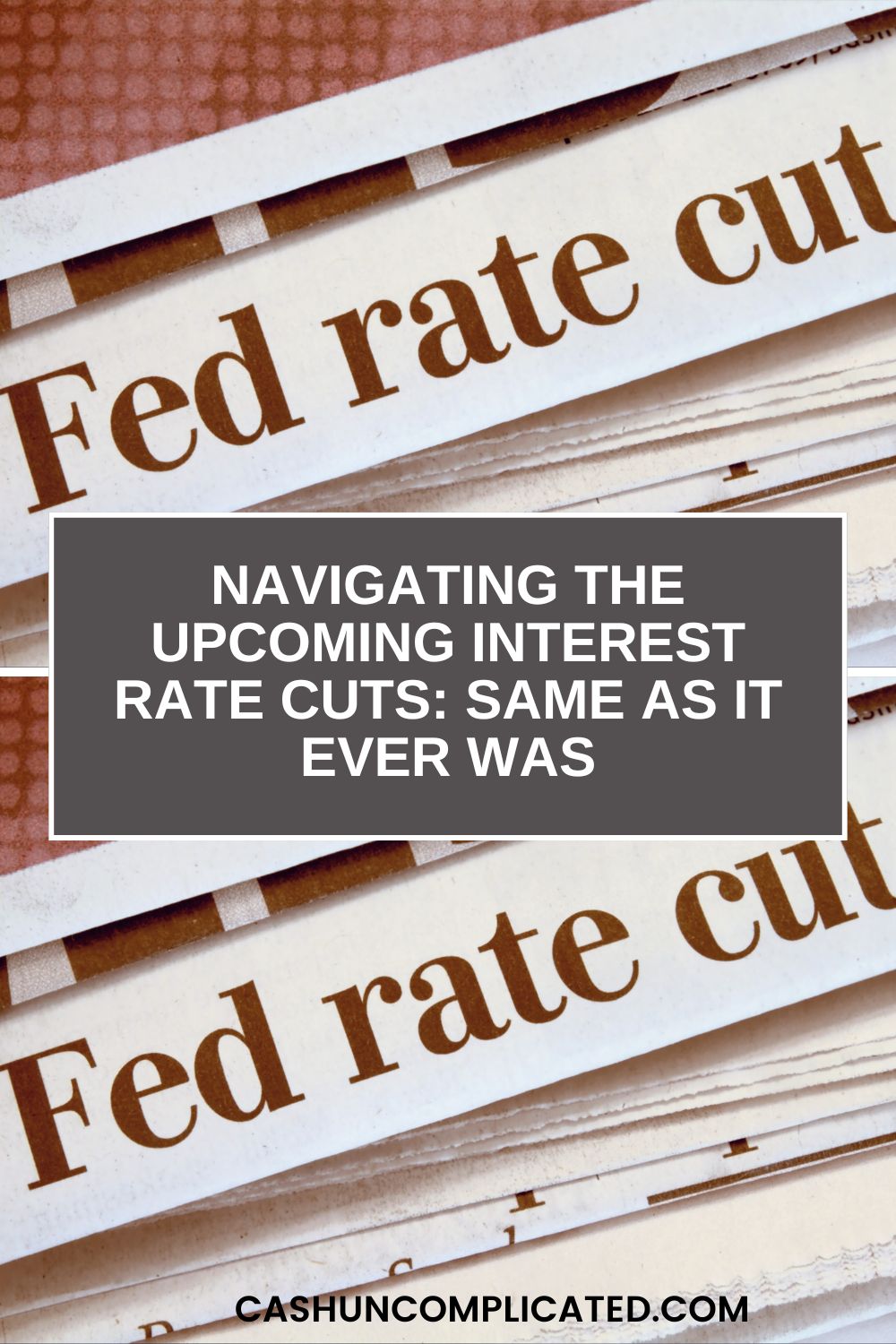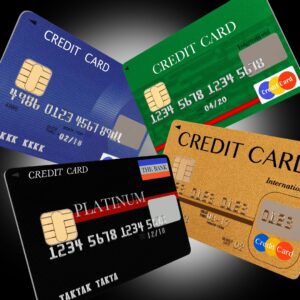The Fed met a couple weeks ago and indicated interest rate cuts were on the horizon. There was lots of media coverage for this as rates haven’t been cut in a couple years. But is this news all that exciting, and what can you do to navigate potential cuts?
Not Financial Advice
Like everything I write, including my book Cash Uncomplicated and blog, this is my opinion. I never give specific financial advice, my goal is to give you information and my opinion.
Then you act accordingly based on the information you’ve gathered from a variety of sources, which can include a financial advisor, news outlets, editorials, podcasts, videos, etc. Hopefully in that process you find my information and opinion valuable, or at least worth considering.
Predictions
Most analysts predict the next cut to be 25 basis points, or in other words, a quarter percent. Four interest rate cuts at that level would be one full point. Six cuts is a point and a half, or 150 basis points, and eight cuts at that level is two points, etc.
The majority of predictions are that the rate cuts will not be fast. Greg McBride, chief financial analyst at Bankrate stated “interest rates took the elevator going up, but they will take the stairs coming down.” Meaning of course that the interest rate cuts won’t have nearly the same speed as the hikes.
Is This Really That Impactful?
An interest rate cut of a quarter percent is a step in the right direction but it’s not going to change things overnight. That’s not a very big number and it would require a series of cuts to make a big impact.
Not to be downplayed is investor psychology. If things seem to be trending in the right direction, that could change things, but the numbers themselves aren’t that significant.
Same as It Ever Was
No matter what the interest rate cuts are, there are certain things that should never change in my opinion. Here’s how I would navigate things, including paying off consumer debt, mortgages, savings accounts, etc.
Credit Cards
Credit card debt in my opinion is the worst kind of debt there is. The interest rates are sky high and you’re paying for depreciating things (not assets) you bought in the past. Plus there’s no cash flow or income being derived from these purchases.
So here’s my opinion on how to navigate credit card debt as interest rates get cut. That advice is the same whether rates are rising or falling. Pay off all credit card debt as quickly as possible because the rates are sky high. Currently the interest rate on credit cards is over 20 percent.
A slight interest rate cut isn’t going to change that very much. Whether it’s 23 percent or 22 makes very little difference to me. Both rates are unacceptably high and I want them gone as fast as humanly possible.
If you’re able to do a balance transfer to another card with zero percent APR for the first several months to a year that’s helpful, but even with that, I would pay those cards off as fast as possible. All my financial attention would go towards it.
Car Loans
Like credit cards, I put car loans in the bucket of consumer debt. My stance is to pay off consumer debt as fast as possible. Car loans have much lower rates than credit cards, so they aren’t quite as bad, but they are still taking away from your wealth.
Which is why I advocate paying them off as fast as possible, or even better, paying cash for a car.
Even with interest rates getting cut, a car loan going from eight percent down to seven is still a problem. It’s a lot more than I want to pay because I want to pay zero. While it’s nice for interest rates on a car loan to go down, they are still a “bad debt” and every effort should be made to get rid of it.
Personal Loans
People often take out personal loans to consolidate debt, pay for a home improvement, cover an emergency, etc. When interest rates were low this was an appealing option because people could get rates in the fives and sixes, do a home renovation or something else, and then pay it back fairly quickly.
Now the rates are around double digits so this option is not nearly as appealing. To give context, the average return on the stock market over the last several decades has been a little higher than 10 percent. Most people consider this to be a good return, especially as compounding occurs over multiple years.
When you’re paying 10 percent instead of earning it, it’s a good return for the lender. They are making money at your expense while you struggle to pay off the loan.
While it’s a step in the right direction for rates to be cut, they still aren’t significant enough to help much with personal loans. Like credit cards and car loans, I advocate to pay personal loans off as soon as possible.
I wouldn’t wait around for rates to drop too much because they probably aren’t going to drop enough to make a big difference, while paying them off will make a monumental difference.
Student Loans
There’s a little more wiggle room with student loans in my opinion. If you still have rates in the two’s and three’s, I wouldn’t be in a big rush to pay them off. The rate cuts aren’t going to impact you because it’s incredibly unlikely they are going to be cut all the way down to those levels.
However, if your loans are six percent or more, the interest rate cuts are only going to decrease them a little bit. That’s where it’s important to do the math and figure out if you should just pay them off now or use the money to invest.
Rate cuts or not, a big thing to consider with student loans is where you are financially. If you’re struggling to invest 10 percent or more of your income and have student loans with less than four percent interest, the money is probably better off invested.
However, if you are near financial independence and investing high amounts of money every month, paying off all student loans is appealing just to get rid of them. Whether there are rate cuts or not is incidental to you because your goal at that point is to eliminate all debt other than your mortgage (or maybe that too).
Related: Why I Paid Off My Low Rate Student Loan Debt
Any Other Type of Consumer Debts
For any other type of consumer debts, my suggestion is to always pay them off. No matter what the interest rate is, this is money that is being removed from your pocket and being placed into the lender’s bank account. There’s no way to build long-term sustainable wealth doing this.
Here’s an example. Someone paying $500 per month towards some type of consumer debt at 20 percent interest. That’s $500 per month going directly to someone else. If the interest rate is cut to say, eighteen percent and the payment is reduced to $450 per month, that is still $450 going to someone else.
While the debt being reduced is a good thing, it’s still consumer debt and your money is working against you, rather than for you. Even if the interest rate were reduced by half, you’d still be paying someone else.
Mortgages
Perhaps the biggest impact interest rates have is on mortgages. Mainly because the price point is so high that even a slight drop in rates will have an impact on your monthly payment. Not to mention the impact on sales and inventory, but that’s for another post.
For those still with mortgages in the two’s, three’s, and four’s, any upcoming interest rate cuts aren’t going to make much difference. But for those who are in the seven’s and eight’s, it will make a difference. Even going from 7.5% to 6.75% can give you a nice reduction in your monthly payment.
As of this writing, rates are falling in the mortgage industry, so if you have a high interest rate mortgage, now is a good time to look at refinancing.
Savings Accounts
One positive about the higher interest rates over the past couple years is that savers can actually start gaining some interest. Many online savings accounts offer rates around five percent. Which is far greater than the one percent or lower that we had seen in the years before that. So your emergency fund will do a lot better because of this.
With interest rates being cut though, savings accounts will likely yield less. Which means your emergency account and other cash holdings will earn less. One thing to consider is moving some of your cash from a high yield savings account to a CD or treasury.
That way you can lock into your rate for a set period of time. This will guarantee you a certain interest rate rather than have to deal with fluctuations. This is especially applicable to those holding more than six months of an emergency fund. You really want that money to earn something.
What I did, and wrote about in this piece, is to have a layered emergency fund. If you want to see how I allocated my emergency fund, check out the article. My goal with the layered approach is to have some cash readily available in a high yield savings account while also holding a few months of cash in CD’s and I-Bonds.
Conclusion
Navigating interest rate cuts is important. You want to pivot as market conditions change. It’s also a good reminder to live by sound financial principles like avoiding consumer debt, including car loans and personal loans.
If you can follow the principles you really don’t have to worry about interest rates rising or falling on consumer debt because you don’t have any. The only impact it will have on you is on mortgages and high yield savings accounts.
Lastly, don’t get caught majoring in the minors. It’s not worth it to pull your hair out over which online bank offers one twentieth of a percent better rate. What is important is following the principles and staying away from the big things like consumer debt–because that is what makes the difference.
How are you navigating changing interest rates?









